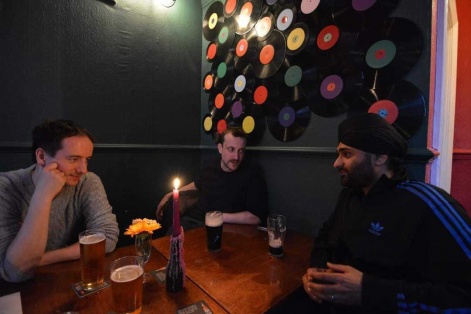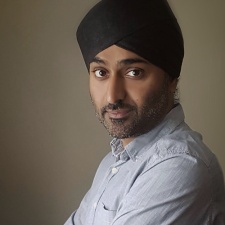For decades, people of colour have suffered through a lack of opportunity and a lack of respect.
The games industry is no different, and here at PocketGamer.biz we wanted to do our part and help bring attention to the many incredible people of colour that help make up this sector.
So, welcome to our POC in Mobile series, where discussion about finding a place in the games industry, the various challenges faced as a minority, and what needs to be done to make games more diverse will be the focal points of conversations.
This week, we spoke to Hutch’s head of art Ravinder Singh Ruprai.
PocketGamer.biz: Can you start off by telling us about your role?
Ravinder Singh Ruprai: I am the head of art at Hutch. My job entails managing art direction within game development and the generation of supporting assets, but my main focus is ensuring that our team facilitates Hutch’s ability to make great games.
A large portion of my role is centred around keeping our teams equipped with the training and resources they need, as well as making business cases for how we can support investment and additional growth.
Why did you want to work in the mobile games industry?
My background was originally within triple-A games, wherein I had around 18-20 years of experience, and I had recently left a studio.
What made me love working in mobile was the culture.
Rav Singh
I attended an event where I bumped into an ex-Playfish team member and we got chatting. He asked me why I hadn’t tried mobile yet and I felt I had already invested a large chunk of my current career into triple-A games. He explained that no one could take that experience away from me, so why not take a risk and try something new, and that really resonated with me.
Shortly after I started a role at Plumbee which was a huge change for me. There was an exciting startup atmosphere, and what really stuck with me was the CEO handed me a screwdriver to build my own desk! It was a right of passage within the early days of the company, all of the other five employees and the CEO had also built their own.
With mobile, being able to fix bugs and update games after release with a regular series of content drops was a very reassuring way of working, completely the opposite of what I had found in triple-A.
What made me love working in mobile was the culture. No crunch was, of course, a huge positive, and for the first time, I really felt like I could finish work on time and have the weekend to myself.
How would you recommend people get started in games?
Networking is a hugely important part of building the foundation of your career. If and when you can, try to get to as many conferences as possible. If you want to work in games, take every opportunity to be involved, and a great way to do so is to attend these types of industry events. You’ll meet a wide variety of professionals who you can ask questions about their own careers paths and showcase yourself.
Never underestimate the impact a friendly email can have.
Rav Singh
Also, never underestimate the impact a friendly email can have. Reach out to those you look up to and share your work with them, ask questions and show initiative. Initiative is exciting for developers and the timing of your email might be when they are looking for new hires.
Outside of this, follow gaming companies on social platforms to build your knowledge, and the trade press is a great way to keep up to date on the latest events. Having expert knowledge not only shows an understanding of the industry but also shines a light on your passion.
What did you study (if anything) for your role? Are there any courses out there that you would advise for aspiring professionals?
I completed a degree in Art and Media specialising in computer animation, and I’m certainly an advocate for getting a degree. Make sure that when you are researching your choices you find out which university has the best hiring rate. They will be harder to get into, but highly worth the effort.
Evolving your portfolio should be a recurring task for you while studying, as it’s one of the best tools to get your foot in the door. Outreach will be greatly supported if you are able to share samples of your work with companies.
You can also consider entering the industry via an entirely different route through roles such as quality assurance and potentially work your way into a different role when in the company once you have gained sufficient experience and proven yourself.
What do you think should be done to improve diversity?
Recent world events have shown companies the need for true diversity, but the industry needs to be honest with itself. Whilst we have achieved a great deal, we need to do more.
My personal view is that we should be celebrating and encouraging true equality, meaning recognising people from every diverse group and the issues they face rather than focusing on a few isolated groups in the short term.
The first step is for businesses to stop over-relying on HR to solve the problems we see. All parts of the business share the responsibility. With a diversity and inclusivity foundation, recruitment will become a more naturally diverse process, instead of creating a demand for meeting quotas dispassionately.
We should be celebrating and encouraging true equality, meaning recognising people from every diverse group and the issues they face.
Rav Singh
When it does come to hiring, companies should be looking at people that don’t just add value from a corporate agenda perspective but are a cultural fit.
There is a saying: ‘diversity is about being invited to the party, inclusion is about being asked to dance’. This sums things up nicely because it’s not just about getting more diverse candidates through the door but making sure that all employees feel truly included once they are in.
What are the biggest challenges you have encountered since joining the industry?
Confidence and my personal belief in myself was a major challenge. I feel that as a result of my cultural background, I stand out in society. Earlier in my career, I should have been able to point out issues I saw with confidence and used these moments to ask those around me for guidance and help.
One frequent occurrence that really highlighted the problems with diversity in the workplace was speaking to colleagues after work at the pub. The pub becomes something of an implied safe space where people’s work personas are lifted. As a result, this is where people feel free to say anything they want and it’s here that small comments, phrases or questions can become quite offensive.
People are much more aware of what is appropriate and what isn’t nowadays, but it’s also everyone’s responsibility to call out any inappropriate or offensive comments towards colleagues if they overhear them.

What do you think can be done to help encourage more people of colour to get into games?
There are many things that can still be done, but I think one interesting way that things are actually getting better are experiences of internal discrimination. There is this joke that Asian parents have narrow expectations of what they want their children to be.
A large number of people within my parents’ generation took low skilled jobs when they migrated to the U.K. and did not want a similar life for their children. Given the bias they faced, it was highly unlikely they would have been accepted in either a corporate or public service environment even if they were qualified to do so. It’s a sad reality that my father had to remove his turban and cut his hair to get a job as society struggled to accept his foreign outward appearance.
I know my kids look at me as a template for what they could do in their future.
Rav Singh
My own parents wanted me to become a doctor, an architect or a lawyer when I was studying. My generation was really the first where we were able to, in large numbers, start breaking this expectation. We began working in creative corporate roles and following our dreams in other industries.
Now my children and siblings don’t care about those original restricting ideologies and are more confident to go into any career. As a father, I know my kids look at me as a template for what they could do in their future, as they do for others they feel are representative of them.
Is there anything that recruiters should be doing differently to address the lack of diversity across not only games development but all industries?
Recruiters need to be at the forefront of driving diversity and can help by sourcing and approaching a diverse group of talent. As recruitment becomes a more diverse field, they have a foot in the camp of helping to influence or enhance the pipeline with diverse candidates.
The process should be friendly to diversity, ensure each step takes into account bias, and works to reduce that. This can be done by training hiring managers and interviewers on recruitment bias and helping them to move forward. Processes need to be established to screen who can add to company culture, not just fit in with what is familiar.
Recruitment firms across the industry should have the confidence to challenge the status quo if, for example, they feel that a studio’s brief is too specific and not open enough to attract different candidates.
Since the surge in the #BlackLivesMatters campaign, what changes have you seen from across the industry to address the issue?
Things that are wrong are being publicly and clearly called out as wrong, and the message that this kind of treatment will not be accepted anymore is evident.
The games industry has a seemingly narrow focus on what diverse groups it directs resources to support
Rav Singh
It’s been great to see the BLM movement appear in public spaces such as football leagues, and it’s encouraging that these issues are now being discussed in a more open and frank way, compared to the traditional ‘bury and forget’ approach.
Individuals like me are able to internalise and reflect on past experiences, and we’re able to get a better understanding of issues we have faced. This helps to establish clearer rules and responses for possible future events, preventing them from occurring or passing by without being confronted again.
One challenge we still face is that we must ensure that the goal of equal representation is actually equal. The games industry has a seemingly narrow focus on what diverse groups it directs resources to support. Consistency and equal distribution of support is the next step that will enable truly valuable representation across a wide variety of communities.

What advice do you have for other people of colour that are looking at getting into games?
Make sure your best work is close to hand, network, get insights and evaluate where you want to be as soon as you can. This will give you the best chance of securing that position you know you deserve.
When looking at companies, spend time to learn and understand what their core values are. Then do yourself a favour, look at their people’s page and see who actually works for each company. Do they measure up to their statements, or are they lacking? It’s one thing to shout about values and ideology, but if they aren’t executed on, it’s very telling.
Finally, be yourself, all of yourself. Don’t hide who you are. A company should accept you just as much as you accept them.

